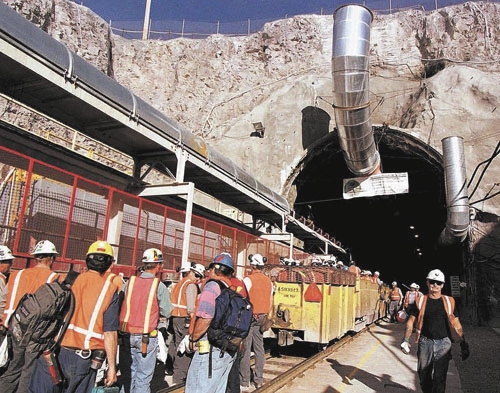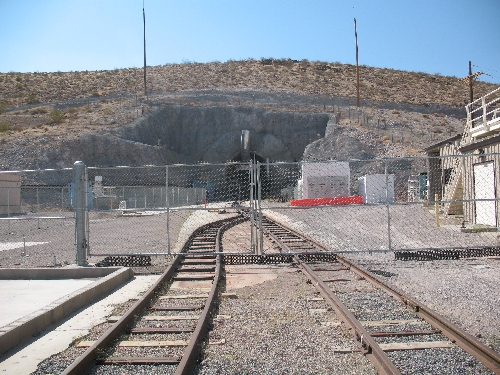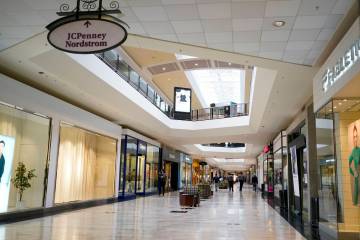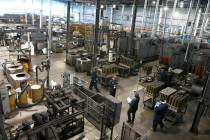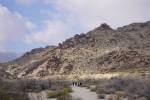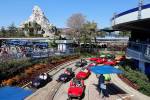Yucca’s nuclear fallout
State and local leaders have spent a quarter century fighting the plan to make Nevada the dumping ground for the nation’s highest-level nuclear waste. But even as the Yucca Mountain repository site turns into a virtual ghost town, proponents of the project vow not to let thousands of job opportunities slip away.
Nightmare scenarios of train derailments and truck accidents spilling deadly radioactive waste and destroying the state’s tourism industry have been talked about for years by the dump’s opponents. Still, the battle over placing nuclear waste at Yucca Mountain — just 100 miles northwest of Las Vegas — heated up as fast as the weather earlier this month. June started with two days of Nuclear Regulatory Commission hearings in Las Vegas to decide whether the Department of Energy can withdraw its application to ultimately ship high-level nuclear waste to the Nye County site.
The Yucca onslaught continued with a June 7 DOE letter ordering the project’s main contractor, USA Repository Services, to cease all work on the project that is not related to contract and employee terminations, record-keeping and network support tasks.
The DOE letter, obtained by the Las Vegas Business Press, is another step toward the project’s demise.
“By June 14, 2010, USA RS shall provide DOE a plan to complete contract shutdown by Sept. 30, 2010,” the agency directed.
The DOE correspondence also rejects an earlier proposal by USA to finish some Yucca work.
“We have determined that to complete ongoing work projects and to develop knowledge retention packages are both costly and unnecessary,” the DOE wrote.
Senate Majority Leader Harry Reid, D-Nev., praised what he called the end of the Yucca Mountain project.
“It’s closed. It’s gone,” said Reid, who is up for re-election in November. “I’ve been saying that for a long time, that it is gone. But it is finally gone.”
Euphoria over the dump’s demise is tempered by the further loss of jobs in Nevada that is certain to follow.
“I feel very bad that people are losing their jobs,” Reid said. “But the alternative would have been more people in our service industry losing their jobs.”
end of Yucca, or a new beginning?
Supporters of putting a nuclear waste repository in Yucca Mountain aren’t giving up. Former Nevada Gov. Robert List has spent about a decade pushing for the project. List works as a consultant for several Nevada counties, including Churchill, Lander, Esmeralda and Mineral.
White Pine County and the states of Washington and South Carolina — both producers of nuclear waste — are allied with List’s clients in the battle to force the DOE to submit its application to the commission.
“We believe the Nuclear Waste Policy Act expresses in its terms, that they must proceed with the application, and the NRC must approve or disapprove of the application,” List said.
The Construction Authorization Board, a licensing arm of the NRC made up of three administrative judges, will have a say in the future of the Yucca application. The commission board, also known as CAB, will rule on whether to honor the Department of Energy’s request to withdraw its application for the project. They publicly heard arguments from both sides on June 3.
The second day of the commission hearings at the Pacific Enterprise Plaza on Pepper Lane was far less dramatic; archiving proposals for thousands of Yucca-related documents was the main topic of discussion. But for Yucca die-hards on both sides, every step toward the project’s demise is closely observed.
Bruce Breslow, Nevada’s executive director of the Agency for Nuclear Projects, maintained that Yucca Mountain is a bad choice for a nuclear waste storage facility. He opposes the plan to send 1,000 shipments of the most toxic nuclear waste to Nevada each year.
Breslow called the DOE’s science faulty and said the federal agency’s application was “full of holes.”
“The state of Nevada has 223 safety, environmental and legal contentions that have been admitted by federal judges,” Breslow said.
The Energy Department, under the Obama administration, has changed its stance on Yucca Mountain and wants to abandon plans to put a nuclear repository on the site.
One of the state’s safety concerns involves the delayed installation of 1,500 titanium “drip shields” at the site, Breslow said. The shields are designed to prevent groundwater contamination from the nuclear waste and would cost between $8 billion and $10 billion to install, he said.
However, the Energy Department did not have plans to put in the drip shields until 80 to 100 years after the initial shipments of nuclear waste arrived at Yucca Mountain.
Breslow pointed to that as one safety risk with no practical proposed solution.
“The temperature in the mountain (from nuclear waste) would reach 500 degrees, hotter than any human could bear,” he explained. “So, they would have to send robots in to install the heat shields, and after a hundred years, conditions would have deteriorated and rocks would have fallen.”
The DOE did not respond to requests for comments for this article.
List offered his own theory on why the agency might want to keep a low profile.
“I think the DOE is embarrassed by it (the loss of jobs),” he said. “I don’t think they want to admit the consequences of their arbitrary action.”
Where the jobs aren’t
Estimates vary on just how many jobs were, and still are, tied to the proposed Yucca Mountain repository. List’s tally includes as many as 2,000 DOE employees and contractors working on the project during the last decade. About 80 percent of those were believed to have lived in the Las Vegas Valley.
Today, only around 600 work at Yucca or in a related capacity. The number of workers started dwindling as Yucca’s funding was strangled through the efforts of Nevada’s congressional delegation, List said.
“By September, it will be down to about 25 (workers). It will just be environmental management workers,” he noted.
Paul Seidler has been on both sides of the Yucca debate over the years, but today he heads the Las Vegas-based Nevada Alliance for Defense. The Alliance is a group that focuses on technology development.
To Seidler, Yucca was always more of a temporary solution to the permanent problem of nuclear waste. Allowing the temporary storage of nuclear waste at Yucca Mountain would have meant retaining, and adding, thousands of high-paying jobs, he said.
“Our alliance’s interest is in making sure the economy of Southern Nevada diversifies,” he said.
Seidler also pointed to the trickle-down effect. Those Yucca contractors often worked from large offices in Summerlin, now vacant, and spent money in the community.
“We had about 2,000 people working on the project, and now we have about 400, and that number is going down,” he added.
Yucca Mountain opponents say the emphasis on job growth is misleading. The Great Recession would be long over before any measurable employment impact from the Yucca project could possibly be felt.
“The licensing phase would take at least four or five years, so we wouldn’t see any jobs increase until its opening in 2020,” said Irene Navis, planning manager of Clark County Department of Comprehensive Planning’s Nuclear Waste Program. “And the construction jobs would be in Nye County.”
Navis has been “working her way out of a job” for a while. For most employees, that would be a sign of poor job performance. However, in Navis’ case, it’s a sign of a job well done.
The department of comprehensive planning has been fighting the proposal to dump nuclear waste at Yucca Mountain since 1985.
“For the longest time, they kept telling us we didn’t have much of a chance, (that) it was a done deal,” she said. “Now, we are in a strange position in supporting the DOE in its (attempts to withdraw) its application.”
Yucca’s uncertain future
If the DOE can drop its plan to make Yucca Mountain the nation’s nuclear waste repository, many wonder what will become of the site and its former workers. Reid has promised to try to help those employees losing their livelihoods.
“Federal employees were offered early retirements and buyouts, or transfers to a new office in Las Vegas,” he said.
Federal stimulus funding programs may create jobs for some displaced Yucca workers, too.
Ideas abound for the site. Breslow listed some of the top possibilities for Yucca’s alternative uses, including using it as a national data storage facility for computer servers. Another option is converting the mountain, which sits on the Nevada Test Site, into a mining school of some sort.
Counterterrorism activities might be conducted at Yucca Mountain because of its high-security location. Yucca also might be used as a base to detect hidden underground testing facilities in other countries.
“We are also looking at a lot of renewable energy projects at the Nevada Test Site,” Breslow said.
Seidler would like to see Yucca used as a location to manufacture the radioactive isotopes used in medical procedures.
List is less hopeful a project of the repository’s magnitude can be replaced.
“I don’t see anything else with the type of jobs created by this project,” the former governor said. “It is a once-in-a-lifetime opportunity. It’s the biggest public works project in Nevada since Hoover Dam.”
Contact reporter Valerie Miller at vmiller @lvbusinesspress.com or 702-387-5286.
YUCCA MOUNTAIN TIMELINE
1954
The Atomic Energy Act directs the federal government to promote the peaceful use of atomic energy. The disposal of the highly radioactive waste produced is the responsibility of the federal government.
1957
The National Academy of Sciences recommends deep geological burial for spent nuclear fuel and high-level radioactive wastes.
1970
The Atomic Energy Commission, precursor to the Department of Energy, selects an old salt mine in Lyons, Kan., as the nation’s first repository. Moving water is discovered inside the salt mine and further efforts to use this site as a repository stop.
1970s
The Department of Energy begins to scope potential repository areas at the Nevada Test Site, including the Climax mine that experimentally stored 17 fuel rods until the area became unsafe for human entry.
1974
President Gerald Ford bans spent fuel reprocessing after India detonates a nuclear device containing plutonium.
1982
Congress approves the Nuclear Waste Policy Act, calling for two repositories — one in the East and one in the West. Nine potential sites are identified.
1983
The DOE names nine potential repository sites in six states.
The Nevada Legislature creates the Nuclear Waste Project Office, under the governor’s office, to review activities by the DOE as it begins to scope sites around the country, including Yucca Mountain.
1985
The Legislature transforms the Nuclear Waste Project Office into the independent Agency for Nuclear Projects and creates the Nevada Commission on Nuclear Projects to advise the governor and Legislature on matters related to the disposal of radioactive waste.
The Clark County Commission begins passing resolutions against a high-level nuclear waste repository at Yucca Mountain.
1986
The DOE selects sites in Nevada, Washington and Texas for detailed investigation, one of which is Yucca Mountain.
1987
Congress amends the Nuclear Waste Policy Act, singling out Yucca Mountain on the edge of the Nevada Test Site as the location for the DOE to study as a nuclear waste repository after costs to study multiple sites soar.
1988
The Nuclear Waste Program of Comprehensive Planning in Clark County is created to provide oversight, assess effects on communities and provide public outreach on the Yucca Mountain Project.
1991
Surface studies begin at Yucca Mountain.
1993
DOE begins grading work and formulates a program that schedules waste acceptance by 2010.
1994
Tunneling into Yucca Mountain begins for Exploratory Studies Facility.
1997
Tunnel Boring Machine breaks through rock, completing the five-mile long Exploratory Studies Facility tunnel.
1998
The DOE misses its deadline for opening a nuclear waste repository at Yucca Mountain, and nuclear utilities begin to sue the government for failing to take the waste.
2000
President Bill Clinton vetoes nuclear waste legislation passed by Congress.
2001
The Environmental Protection Agency announces proposed radiation standards for Yucca Mountain.
2002
President George W. Bush and Congress approve Yucca Mountain as a nuclear waste repository for the nation’s radioactive waste.
In April, Nevada Gov. Kenny Guinn vetoes the designation of Yucca Mountain, but Congress overrides the veto with a two-thirds majority vote. Bush signs the joint resolution into law July 23, officially designating Yucca Mountain as the nation’s proposed repository site.
2003
The DOE is scheduled to release a nuclear waste transportation plan.
Nevada prepares for oral arguments in front of the D.C. Court of Appeals.
2006
The DOE changes its written timetable, estimating that it will begin accepting spent fuel and high-level nuclear waste at a Yucca Mountain repository from 2010 to March 31, 2017.
2008
The DOE expects to submit a license application.
2010
In February, President Barack Obama’s proposed federal budget for fiscal year 2011 is released, eliminating funding for the program to build a nuclear waste repository at Yucca Mountain.
The Department of Energy budget provides funds for a nuclear waste management strategy.
The Department of Energy files a motion to stay the Nuclear Regulatory Commission licensing proceedings and indicated its intent to formally withdraw the license application within prejudice in 30 days. “With prejudice” means the DOE can’t bring back the application in the future.
Beginning on June 3, Nuclear Regulatory Commission’s Construction Authorization Board convenes in Las Vegas for two days of hearing to decide whether the Department of Energy should be able to withdraw its application to build a nuclear waste repository at Yucca Mountain. Archiving of Yucca documents is discussed.
On June 7, the Department of Energy sends a letter to Yucca Mountain’s contractor, USA Repository Services, ordering it to cease work on the Yucca project and begin terminating employees and
contracts.



